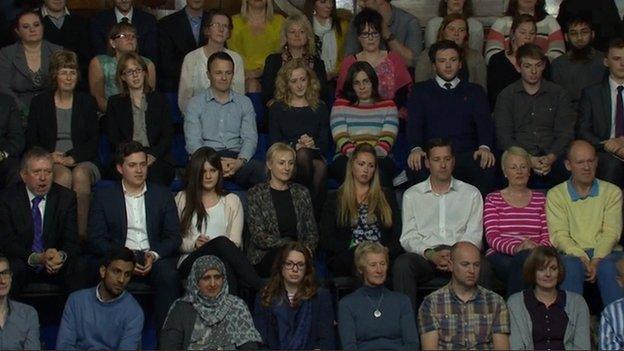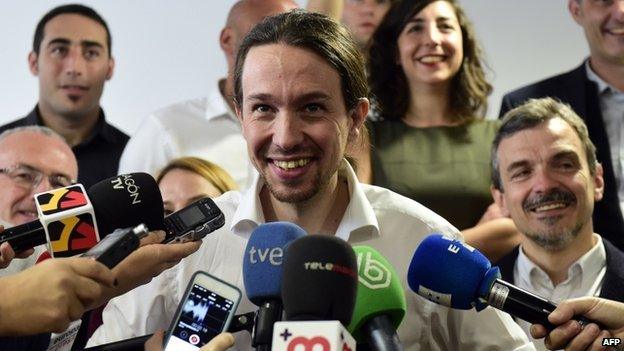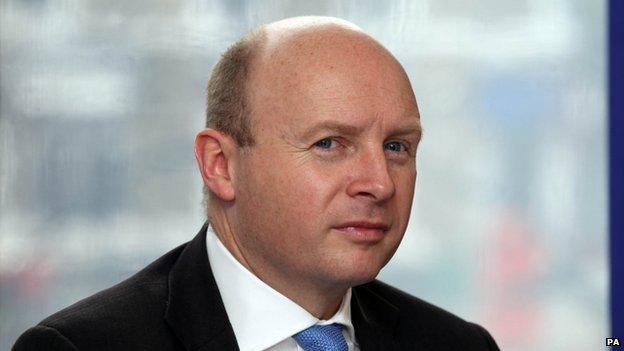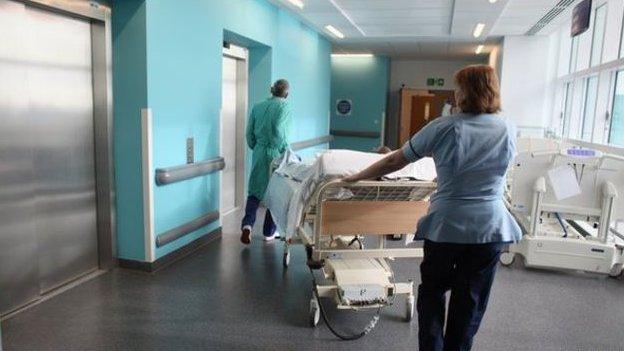Election 2015: Voters' trust remains elusive
- Published

Were the audience at Question Time convinced?
Rarely has such political energy been expended to such little effect. Or so it seems.
Five and a half weeks of sound bites and fury have signified little.
Pollsters and the political cognoscenti are bemused as they peruse 76 campaign polls and shake their heads over graphs that are stubbornly flat-lining.
All anyone can say is that it is too close to call. Neither major party has nailed an advantage.
The widely-judged star of the campaign - Nicola Sturgeon - was unforeseen.
And yet this often-uninspiring election reveals much.
What hangs over it is still the financial crash of 2008 and what followed. It is the reference point.
The roots of almost every political argument can be traced back to that moment in time.
In the UK there is not the boiling anger of Greece's streets or Spain's indignant ones or Italy's black-masked anarchists.
Widespread scepticism
But having travelled thousands of miles in the past few weeks the mood of the public seems reserved, even deliberately withdrawn; a land where political loyalty is withheld or not traded lightly.
The political world across Europe and in the UK is still shaken.
It has not settled or found a new equilibrium. Insurgent parties, right, left, nationalist have prospered.

Anti-austerity party Podemos have had a big impact in Spain
The mainstream political class remains unpopular and, above all, not trusted.
That scepticism seeped through almost every question posed on last week's Question Time.
Written on face after face was: "I don't believe you".
A significant pool of voters believes the crash of 2008 was caused by the greed of bankers and that the tax-payers were left to pick up the tab.
In some parts of Europe that was indisputably true. In the euro-zone the recovery has been tepid with youth unemployment a stain on Europe.
In the UK growth has been much more robust.
The Conservatives point out that they have presided over the creation of more jobs than the rest of the EU put together.
And yet the mood of insecurity has not lifted.
Many people do not feel better off. They live with short-term contracts.
Rising inequality
Only now is the standard of living edging above 2010 levels and not for everyone.
Above all inequality has widened and undermines support for the mainstream parties.
Ed Miliband has not just tapped into that discontent, he has rooted his campaign in it.

Liam Byrne left an infamous note when he left the Treasury
His core message - repeated time and again - is summed up in this question: "Who is this country run for - the richest and most powerful, or the working families of Britain?"
It is a campaign that draws its energy from perceived social injustice, on unfairness, on inequality.
At every opportunity David Cameron is portrayed as the candidate of the well-off.
An Ipsos-Mori poll found that 65% of those questioned viewed the Tory leader as out of touch with ordinary people.
The Tories, too, root their cause in 2010 and the period before.
David Cameron has taken to pulling from his suit pocket the note left by Liam Byrne, Labour's departing Chief Secretary to the Treasury in which he declared: "There is no money."
Struggle for ascendancy
In this narrative Labour was reckless with the public finances and the UK had a deficit of almost Greek proportions.
The Tories say they reduced the deficit and put the country back on the road to prosperity.
For almost six weeks these two narratives have been fought over in a struggle for ascendancy.
Early on David Cameron was put on the defensive when he was asked about the number of food banks.
In 2014-15 three days of free food were given out a million times. Charities claimed it was a record number and food banks became one of the leitmotifs of the campaign.
David Cameron argued that he had presided over a jobs "miracle" and he never tired of saying that "great public services had to be paid for".
In each of the past five years more money was put into the NHS.

General election turnout:
2010 - 65.1%
2005 - 61.4%
2001 - 59.4%
1997 - 71.4%
1992 - 77.7%
1987 - 75.3%

Both major parties are committed to reducing the deficit.
The Tories said they would cut £12bn from welfare without providing the details.
Labour responded by insisting that "Tory cuts are on the ballot paper at this election" and claimed the Conservatives were "planning to devastate family finances".
But Labour, too, was vague as to the cuts they would make and their timescale for bringing down the deficit.
David Cameron said: "Labour was planning to go with the deficit for ever, borrowing for ever."
Failure to connect
What is interesting is that in the artillery exchange of figures and claims and counter-claims on tax and funding - how little they seem to resonate.
Almost no-one I spoke to had been won over or swayed by a particular promise.

The NHS is a traditional election battleground
So in these final days the battle is on familiar turf.
Labour defines the choice as protecting public services, as preventing the NHS from "sliding backwards", as shielding the country from "extreme cuts", and ensuring the recovery extends beyond the City of London - which, incidentally, it has.
The Conservatives want the voter with "the stubby pencil" to choose between David Cameron and Ed Miliband as the best prime minister, to not take risks with the recovery, to protect the country from Labour's higher spending, taxes and debt.
David Cameron wants every voter to ask one question in the polling booth: "Who do I trust to run the economy?"
The Conservatives have devoted much energy to saying that Labour cannot form a government on its own and will be propped up by the SNP.
These two narratives have been fought to a draw.
Coalition options
So in the final days the question is - who will form a coalition with whom, which party will have the legitimacy to govern?
The Liberal Democrats, who are expected to lose many of their seats, are already setting out their red lines for any future coalition partner.
The abiding sentiment of this campaign is the lack of trust.
The politicians know it.
That is why the Tories have vowed to introduce a law guaranteeing no rise in tax rates before 2020 - as if, without legislation, they could not be trusted to carry out their own promises.
Ed Miliband has written his commitments on a tablet of stone to be erected in the Downing Street garden as if to say that without such a monument he could not trust himself to deliver on his promises.
In the days that follow the vote the question is how soon a legitimate government can be formed that will carry the trust of the voters.
In the past few years in Europe there has been a pervasive sense of control slipping away, of power migrating in the face of global currents dimly understood.
The welfare democracies, which had defined post-war Europe and were the very essence of the European dream no longer appeared sustainable.
The French president said Europe had entered a "period of deconstruction".
Political leaders openly spoke of the exhaustion of the social democratic model or even questioned the future of liberal democracy itself.
Europe, too, will be watching to see how the UK fits into a period of voter anger and frustration.